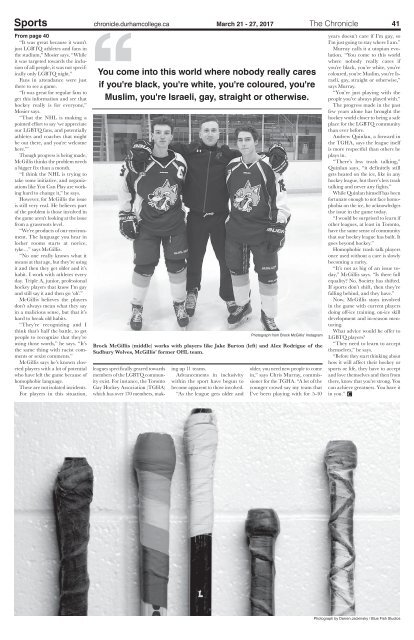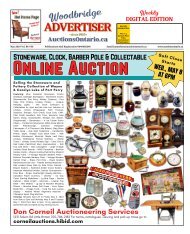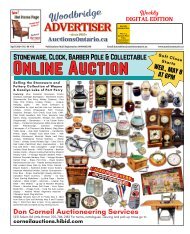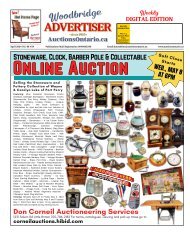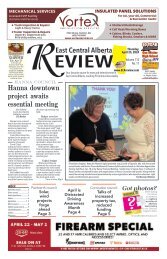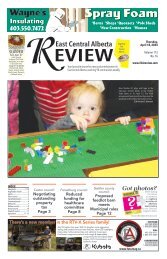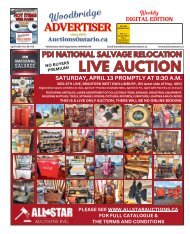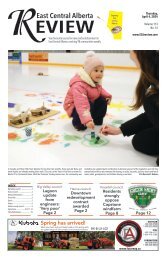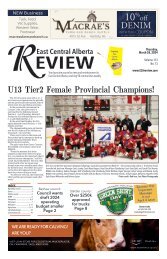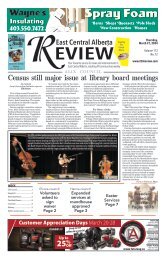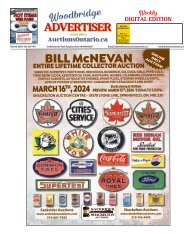Create successful ePaper yourself
Turn your PDF publications into a flip-book with our unique Google optimized e-Paper software.
Sports chronicle.durhamcollege.ca March 21 - 27, 2017 The Chronicle 41<br />
From page 40<br />
“It was great because it wasn’t<br />
just LGBTQ athletes and fans in<br />
the stadium,” Mosier says. “While<br />
it was targeted towards the inclusion<br />
of all people, it was not specifically<br />
only LGBTQ night.”<br />
Fans in attendance were just<br />
there to see a game.<br />
“It was great for regular fans to<br />
get this information and see that<br />
hockey really is for everyone,”<br />
Mosier says.<br />
“That the NHL is making a<br />
pointed effort to say ‘we appreciate<br />
our LGBTQ fans, and potentially<br />
athletes and coaches that might<br />
be out there, and you’re welcome<br />
here.’”<br />
Though progress is being made,<br />
McGillis thinks the problem needs<br />
a bigger fix than a month.<br />
“I think the NHL is trying to<br />
take some initiative, and organizations<br />
like You Can Play are working<br />
hard to change it,” he says.<br />
However, for McGillis the issue<br />
is still very real. He believes part<br />
of the problem is those involved in<br />
the game aren’t looking at the issue<br />
from a grassroots level.<br />
“We’re products of our environment.<br />
The language you hear in<br />
locker rooms starts at novice,<br />
tyke…” says McGillis.<br />
“No one really knows what it<br />
means at that age, but they’re using<br />
it and then they get older and it’s<br />
habit. I work with athletes every<br />
day. Triple A, junior, professional<br />
hockey players that know I’m gay<br />
and still say it and then go ‘oh’.”<br />
McGillis believes the players<br />
don’t always mean what they say<br />
in a malicious sense, but that it’s<br />
hard to break old habits.<br />
“They’re recognizing and I<br />
think that’s half the battle, to get<br />
people to recognize that they’re<br />
using those words,” he says. “It’s<br />
the same thing with racist comments<br />
or sexist comments.”<br />
McGillis says he’s known closeted<br />
players with a lot of potential<br />
who have left the game because of<br />
homophobic language.<br />
These are not isolated incidents.<br />
For players in this situation,<br />
You come into this world where nobody really cares<br />
if you're black, you're white, you're coloured, you're<br />
Muslim, you're Israeli, gay, straight or otherwise.<br />
leagues specifically geared towards<br />
members of the LGBTQ community<br />
exist. For instance, the Toronto<br />
Gay Hockey Association (TGHA)<br />
which has over 170 members, making<br />
up 11 teams.<br />
Advancements in inclusivity<br />
within the sport have begun to<br />
become apparent to those involved.<br />
“As the league gets older and<br />
Photograph from Brock McGillis' Instagram<br />
Brock McGillis (middle) works with players like Jake Burton (left) and Alex Rodrigue of the<br />
Sudbury Wolves, McGillis' former OHL team.<br />
older, you need new people to come<br />
in,” says Chris Murray, commissioner<br />
for the TGHA. “A lot of the<br />
younger crowd say my team that<br />
I’ve been playing with for 5-10<br />
years doesn’t care if I’m gay, so<br />
I’m just going to stay where I am.”<br />
Murray calls it a utopian evolution.<br />
“You come to this world<br />
where nobody really cares if<br />
you’re black, you’re white, you’re<br />
coloured, you’re Muslim, you’re Israeli,<br />
gay, straight or otherwise,”<br />
says Murray.<br />
“You’re just playing with the<br />
people you’ve always played with.”<br />
The progress made in the past<br />
few years alone has brought the<br />
hockey world closer to being a safe<br />
place for the LGBTQ community<br />
than ever before.<br />
Andrew Quinlan, a forward in<br />
the TGHA, says the league itself<br />
is more respectful than others he<br />
plays in.<br />
“There’s less trash talking,”<br />
Quinlan says, “it definitely still<br />
gets heated on the ice, like in any<br />
hockey league, but there’s less trash<br />
talking and never any fights.”<br />
While Quinlan himself has been<br />
fortunate enough to not face homophobia<br />
on the ice, he acknowledges<br />
the issue in the game today.<br />
“I would be surprised to learn if<br />
other leagues, at least in Toronto,<br />
have the same sense of community<br />
that our hockey league has built. It<br />
goes beyond hockey.”<br />
Homophobic trash talk players<br />
once used without a care is slowly<br />
becoming a rarity.<br />
“It’s not as big of an issue today,”<br />
McGillis says. “Is there full<br />
equality? No. Society has shifted.<br />
If sports don’t shift, then they’re<br />
falling behind, and they have.”<br />
Now, McGillis stays involved<br />
in the game with current players<br />
doing off-ice training, on-ice skill<br />
development and in-season mentoring.<br />
What advice would he offer to<br />
LGBTQ players?<br />
“They need to learn to accept<br />
themselves,” he says.<br />
“Before they start thinking about<br />
how it will affect their hockey or<br />
sports or life, they have to accept<br />
and love themselves and then from<br />
there, know that you’re strong. You<br />
can achieve greatness. You have it<br />
in you.”<br />
Photograph by Darren Jackinsky / Blue Fish Studios


